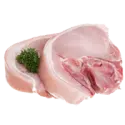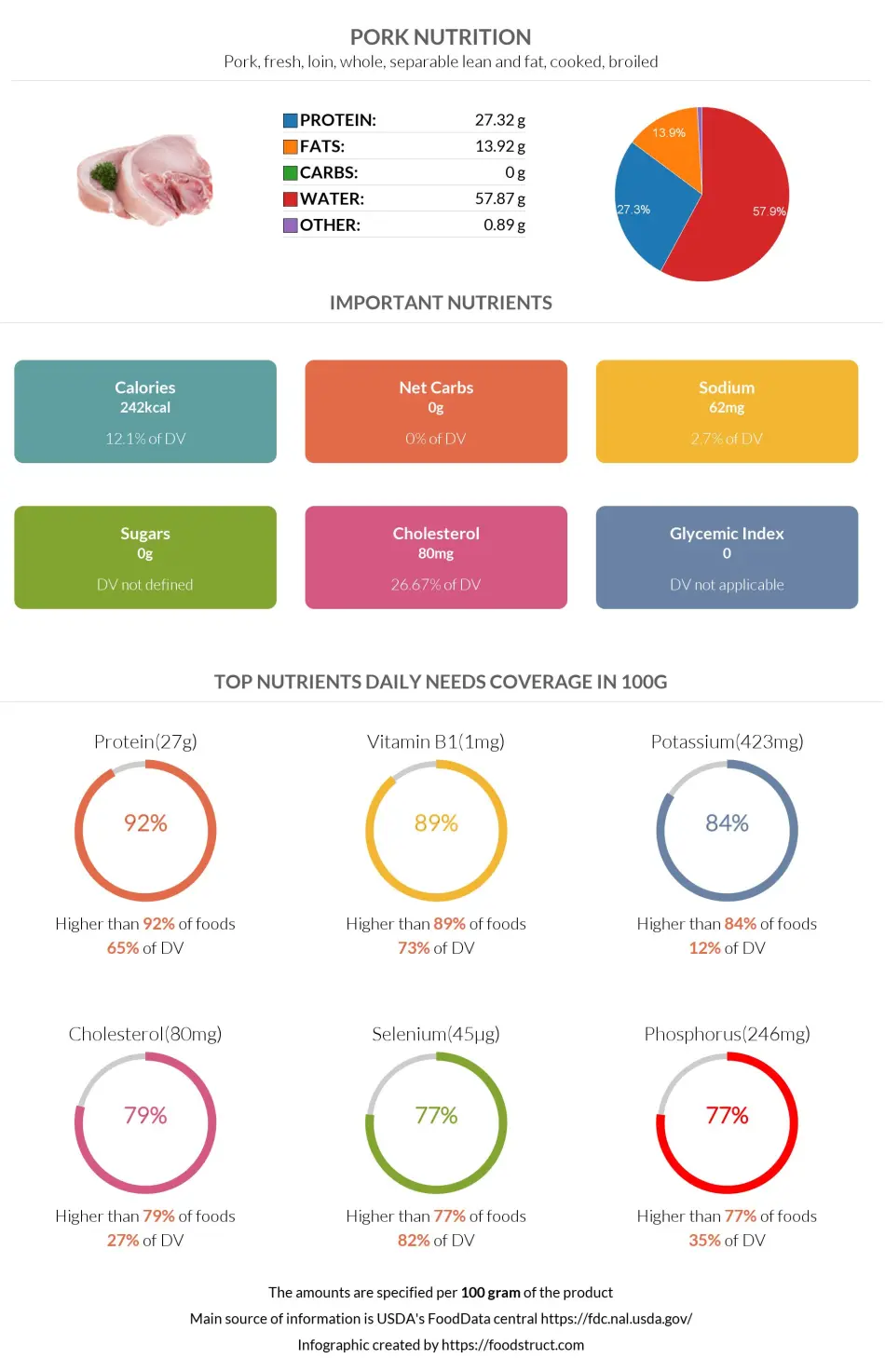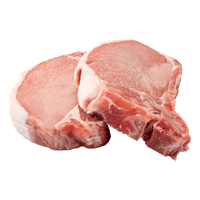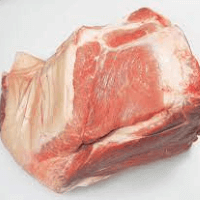Pork nutrition: calories, carbs, GI, protein, fiber, fats
Pork, fresh, loin, whole, separable lean and fat, cooked, broiled
*all the values are displayed for the amount of 100 grams
Top nutrition facts for Pork

| Calories ⓘ Calories for selected serving | 242 kcal |
|
Glycemic index ⓘ
Source: The food is assumed to have 0 or no glycemic index bason on the fact that it has no carbs and that foods with 0 carbs have no glycemic index
Check out our Glycemic index chart page for the full list.
|
0 (low) |
| Insulin index ⓘ https://ses.library.usyd.edu.au/handle/2123/11945 – II for grilled pork is 19 | 19 |
| Net Carbs ⓘ Net Carbs = Total Carbohydrates – Fiber – Sugar Alcohols | 0 grams |
| Default serving size ⓘ Serving sizes are mostly taken from FDA's Reference Amounts Customarily Consumed (RACCs) | 3 oz (85 grams) |
| Acidity (Based on PRAL) ⓘ PRAL (Potential renal acid load) is calculated using a formula. On the PRAL scale the higher the positive value, the more is the acidifying effect on the body. The lower the negative value, the higher the alkalinity of the food. 0 is neutral. | 12.6 (acidic) |
Protein ⓘHigher in Protein content than 92% of foods
Vitamin B1 ⓘHigher in Vitamin B1 content than 89% of foods
Potassium ⓘHigher in Potassium content than 84% of foods
Cholesterol ⓘHigher in Cholesterol content than 79% of foods
Selenium ⓘHigher in Selenium content than 77% of foods
Pork calories (kcal)
| Calories for different serving sizes of pork | Calories | Weight |
|---|---|---|
| Calories in 100 grams | 242 | |
| Calories in 3 oz | 206 | 85 g |
Pork Glycemic index (GI)
Source:
The food is assumed to have 0 or no glycemic index bason on the fact that it has no carbs and that foods with 0 carbs have no glycemic index
Check out our Glycemic index chart page for the full list.
Mineral coverage chart
Mineral chart - relative view
Vitamin coverage chart
Vitamin A:
6µg of 900µg
0.67%
Vitamin E:
0.87mg of 15mg
5.8%
Vitamin D:
3.9µg of 20µg
20%
Vitamin C:
1.8mg of 90mg
2%
Vitamin B1:
2.6mg of 1mg
219%
Vitamin B2:
0.96mg of 1mg
74%
Vitamin B3:
15mg of 16mg
94%
Vitamin B5:
2.1mg of 5mg
42%
Vitamin B6:
1.4mg of 1mg
107%
Folate:
15µg of 400µg
3.8%
Vitamin B12:
2.1µg of 2µg
88%
Vitamin K:
0µg of 120µg
0%
Vitamin chart - relative view
Macronutrients chart
Protein:
Daily Value: 55%
27.3 g of 50 g
27.3 g (55% of DV )
Fats:
Daily Value: 21%
13.9 g of 65 g
13.9 g (21% of DV )
Carbs:
Daily Value: 0%
0 g of 300 g
0 g (0% of DV )
Water:
Daily Value: 3%
57.9 g of 2,000 g
57.9 g (3% of DV )
Other:
0.9 g
0.9 g
Protein quality breakdown
Tryptophan:
1014mg of 280mg
362%
Threonine:
3702mg of 1,050mg
353%
Isoleucine:
3780mg of 1,400mg
270%
Leucine:
6531mg of 2,730mg
239%
Lysine:
7338mg of 2,100mg
349%
Methionine:
2136mg of 1,050mg
203%
Phenylalanine:
3258mg of 1,750mg
186%
Valine:
4419mg of 1,820mg
243%
Histidine:
3201mg of 700mg
457%
Fat type information
Saturated fat:
5.2 g
Monounsaturated fat:
6.2 g
Polyunsaturated fat:
1.2 g
All nutrients for Pork per 100g
| Nutrient | Value | DV% | In TOP % of foods | Comparison |
| Vitamin A | 2µg | 0% | 68% | |
| Calories | 242kcal | 12% | 39% |
5.1 times more than Orange
|
| Protein | 27g | 65% | 8% |
9.7 times more than Broccoli
|
| Fats | 14g | 21% | 25% |
2.4 times less than Cheese
|
| Vitamin C | 0.6mg | 1% | 46% |
88.3 times less than Lemon
|
| Net carbs | 0g | N/A | 75% |
N/A
|
| Carbs | 0g | 0% | 100% |
N/A
|
| Cholesterol | 80mg | 27% | 21% |
4.7 times less than Egg
|
| Vitamin D | 1.3µg | 13% | 42% |
1.7 times less than Egg
|
| Magnesium | 28mg | 7% | 35% |
5 times less than Almonds
|
| Calcium | 19mg | 2% | 55% |
6.6 times less than Milk
|
| Potassium | 423mg | 12% | 16% |
2.9 times more than Cucumber
|
| Iron | 0.87mg | 11% | 65% |
3 times less than Beef broiled
|
| Sugar | 0g | N/A | 100% |
N/A
|
| Fiber | 0g | 0% | 100% |
N/A
|
| Copper | 0.07mg | 8% | 68% |
1.9 times less than Shiitake
|
| Zinc | 2.4mg | 22% | 36% |
2.6 times less than Beef broiled
|
| Phosphorus | 246mg | 35% | 23% |
1.4 times more than Chicken meat
|
| Sodium | 62mg | 3% | 63% |
7.9 times less than White bread
|
| Vitamin E | 0.29mg | 2% | 67% |
5 times less than Kiwi
|
| Selenium | 45µg | 82% | 23% | |
| Manganese | 0.01mg | 0% | 93% | |
| Vitamin B1 | 0.88mg | 73% | 11% |
3.3 times more than Pea raw
|
| Vitamin B2 | 0.32mg | 25% | 24% |
2.5 times more than Avocado
|
| Vitamin B3 | 5mg | 31% | 32% |
1.9 times less than Turkey meat
|
| Vitamin B5 | 0.7mg | 14% | 46% |
1.6 times less than Sunflower seeds
|
| Vitamin B6 | 0.46mg | 36% | 27% |
3.9 times more than Oats
|
| Vitamin B12 | 0.7µg | 29% | 45% |
Equal to Pork
|
| Vitamin K | 0µg | 0% | 100% |
N/A
|
| Folate | 5µg | 1% | 79% |
12.2 times less than Brussels sprouts
|
| Saturated fat | 5.2g | 26% | 24% |
1.1 times less than Beef broiled
|
| Choline | 94mg | 17% | 52% | |
| Monounsaturated fat | 6.2g | N/A | 26% |
1.6 times less than Avocado
|
| Polyunsaturated fat | 1.2g | N/A | 42% |
39.3 times less than Walnut
|
| Tryptophan | 0.34mg | 0% | 46% |
1.1 times more than Chicken meat
|
| Threonine | 1.2mg | 0% | 47% |
1.7 times more than Beef broiled
|
| Isoleucine | 1.3mg | 0% | 49% |
1.4 times more than Salmon raw
|
| Leucine | 2.2mg | 0% | 50% |
1.1 times less than Tuna Bluefin
|
| Lysine | 2.4mg | 0% | 48% |
5.4 times more than Tofu
|
| Methionine | 0.71mg | 0% | 50% |
7.4 times more than Quinoa
|
| Phenylalanine | 1.1mg | 0% | 51% |
1.6 times more than Egg
|
| Valine | 1.5mg | 0% | 46% |
1.4 times less than Soybean raw
|
| Histidine | 1.1mg | 0% | 45% |
1.4 times more than Turkey meat
|
| Caffeine | 0mg | 0% | 100% | |
| Omega-3 - EPA | 0g | N/A | 100% |
N/A
|
| Omega-3 - DHA | 0g | N/A | 100% |
N/A
|
| Omega-3 - DPA | 0g | N/A | 100% |
N/A
|
Check out similar food or compare with current
NUTRITION FACTS LABEL
Nutrition Facts
___servings per container
Serving Size ______________
Serving Size ______________
Amount Per 100g
Calories 242
% Daily Value*
21%
Total Fat
14g
24%
Saturated Fat 5.2g
0
Trans Fat
0g
27%
Cholesterol 80mg
2.7%
Sodium 62mg
0
Total Carbohydrate
0g
0
Dietary Fiber
0g
Total Sugars 0g
Includes ? g Added Sugars
Protein
27g
Vitamin D
53mcg
6.6%
Calcium
19mg
1.9%
Iron
0.87mg
11%
Potassium
423mg
12%
*
The % Daily Value (DV) tells you how much a nutrient in a serving of food contributes to a daily diet. 2,000 calories a day is used for general nutrition advice.
Health checks
ⓘ
Dietary cholesterol is not associated with an increased risk of coronary heart disease in healthy individuals. However, dietary cholesterol is common in foods that are high in harmful saturated fats.
Source
Low in Cholesterol
ⓘ
Trans fat consumption increases the risk of cardiovascular disease and mortality by negatively affecting blood lipid levels.
Source
No Trans Fats
ⓘ
Saturated fat intake can raise total cholesterol and LDL (low-density lipoprotein) levels, leading to an increased risk of atherosclerosis. Dietary guidelines recommend limiting saturated fats to under 10% of calories a day.
Source
Low in Saturated Fats
ⓘ
While the consumption of moderate amounts of added sugars is not detrimental to health, an excessive intake can increase the risk of obesity, and therefore, diabetes.
Source
Low in Sugars
Pork nutrition infographic

Infographic link
References
All the values for which the sources are not specified explicitly are taken from FDA’s Food Central. The exact link to the food presented on this page can be found below.


